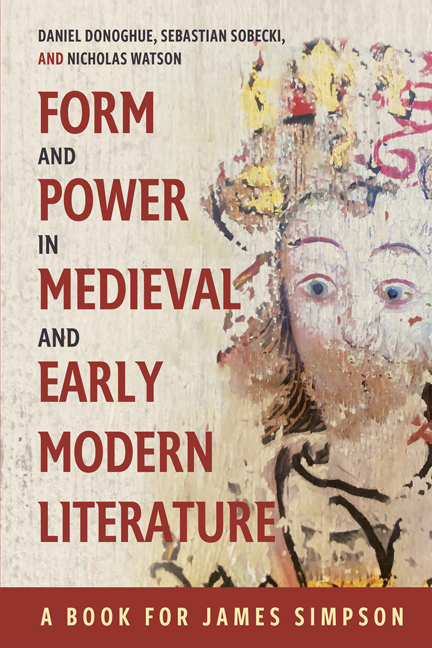Book contents
- Frontmatter
- Contents
- List of Illustrations
- Contributors and Editors
- Acknowledgments
- List of Abbreviations
- Simpson: An Interim Report
- PART I THE HERMENEUTICS OF RECOGNITION
- PART II GENRE AND FIGURE
- PART III CULTURE AND INSTITUTIONS
- PART IV REFORMATIONS
- James Simpson’s Publications from 1984 to 2024
- Bibliography
- A Note on the Bloomfield Conferences
- General Index
- Tabula Gratulatoria
11 - Proverb and Satirical Time: The Digby Poems and Their Fifteenth Century
Published online by Cambridge University Press: 17 May 2024
- Frontmatter
- Contents
- List of Illustrations
- Contributors and Editors
- Acknowledgments
- List of Abbreviations
- Simpson: An Interim Report
- PART I THE HERMENEUTICS OF RECOGNITION
- PART II GENRE AND FIGURE
- PART III CULTURE AND INSTITUTIONS
- PART IV REFORMATIONS
- James Simpson’s Publications from 1984 to 2024
- Bibliography
- A Note on the Bloomfield Conferences
- General Index
- Tabula Gratulatoria
Summary
The serious reflection is composed
Neither of comic nor tragic but of commonplace.
– Wallace StevensIn a 1990 essay that helped set the terms for a reemergent historicism in Middle English literary studies, James Simpson offers a new understanding of late-medieval satire. Speech in early fifteenth-century England was genuinely constrained by newly punitive secular and ecclesiastical legislation, he argues, but to understand the satires of the period – his case examples are Piers Plowman and Mum and the Sothsegger – critics must also “account for their formal properties as a way of negotiating the constraints which both surround and inhabit them.”3 Simpson's reading reveals the feints and dodges that alliterative poets incorporated into their modus dicendi: they place incontrovertible wisdom in the mouths of suspect speakers; they defer to the pronouncements of authoritative institutions, only to reveal their inadequacies. Such tactics authorize a satirical poetic voice but also leave space for that voice to reflect on its own limits.
This essay proceeds from Simpson's insights on the relation between context and form in fifteenth-century satire. Its subject, however, poses a special problem in understanding that relation. The twenty-four lyrics uniquely attested in Oxford, Bodleian Library MS Digby 102 – sandwiched in thirty folia that fall between copies of the comparatively ubiquitous Piers Plowman C and Richard Maidstone's Penitential Psalms, all written as prose in a single hand – seem to address specific historical events, but they almost exclusively speak in commonplaces unlocatable in any specific time, place, or institution. As Helen Barr has observed, the poems are characterized by their “sparseness of specific temporality,” operating in the timeless realm of ethical guidance rather than the time-bound realm of political commentary. Unlike Simpson's case examples, which veil and displace their critiques but nevertheless make unambiguous and sometimes obviously partisan reference to historical events, the Digby poems speak almost entirely in truisms – some creatively extended, some deftly reworked, all lacking the kind of particularity that would allow us to place the poet in a specific place or party.
This essay will argue that such proverbial obliquity might be understood as another formal strategy available to the late-medieval English satirist, albeit one aimed as much against the risk of obsolescence as the constraints of censorship. It will do so in part by extending our account of the provenance of Digby 102.
- Type
- Chapter
- Information
- Form and Power in Medieval and Early Modern LiteratureA Book for James Simpson, pp. 201 - 222Publisher: Boydell & BrewerPrint publication year: 2024

